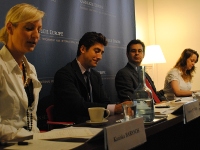Registration
You will receive an email confirming your registration.
IMGXYZ2729IMGZYXThe recent referendum on constitutional reform was a victory for Turkey’s ruling Justice and Development Party (AKP). Its success may embolden the Turkish government to enact measures revitalizing the country’s bid for EU membership. However, the referendum could also deepen Turkey’s political divisions and paralyze the country’s reform process.
At a discussion co-hosted by Carnegie Europe and the Center for European Reform, Carnegie’s Sinan Ülgen explained how Turkey’s political system has complicated the country’s bid to join the EU. He was joined by Katinka Barysch, deputy director of London’s Centre for European Reform and Heather Grabbe, director of the Open Society Institute–Brussels and director of EU affairs for the Soros network. Carnegie’s Fabrice Pothier moderated the discussion.
Domestic Support for European Integration
In Turkey, the domestic coalition of political parties and civil society groups that supported the EU reform agenda lacked cohesion and resilience, Ülgen said. Ultimately, the coalition broke apart after initial setbacks in the accession negotiation process. He highlighted four main factors that contributed to this breakdown:
- Politicization of Negotiations: The politicization of the negotiation process was a handicap for EU supporters in Turkey. Accession negotiations should focus primarily on technical issues, addressing the adoption of the acquis communautaire. In Turkey’s case, however, negotiations were highly politicized. Throughout the process the possibility of the country ever attaining EU membership remained in doubt. This altered the overall nature of the accession talks and prevented meaningful progress.:
- Polarized Political System: Despite eight years of uninterrupted rule by the AKP, the polarization of the political system in Turkey has continued, with splits deepening between secular and religious groups and along ethnic lines. These divisions made reaching the level of consensus required by a reform agenda difficult.
- Unrealistic Expectations: Turks initially had unrealistic expectations about the degree of change that Europeanization would bring at the domestic level. Different stakeholders had different expectations: religious groups hoped for a relaxation of secularism, ethnic minorities for an increased emphasis on human rights, and young workers for European visas. The lack of short-term progress has frustrated these different groups and contributed to the general loss of momentum in negotiations and the reform processes.
- The AKP: The AKP itself contributed to the loss of confidence in the EU accession agenda in Turkey. The party supported the EU reform agenda following its election in 2002, seeing movement toward membership in the EU as a way to legitimize the AKP government domestically. This drove Turkey’s opposition parties to adopt increasingly skeptical rhetoric toward the EU.
The View from Brussels
- The EU and the AKP: By publicly identifying the AKP as the most prominent pro-EU party in Turkey, Ülgen stated, the EU contributed to the lack of cross-party consensus in Turkey on the reform agenda. Grabbe agreed, adding that the AKP’s longevity compounds the tendency of the EU to identify the party as its primary interlocutor, and therefore to underestimate the importance of other actors. Moreover, she added, opposition parties have proved difficult to engage due to the technical nature of the various chapters in the accession negotiations, which require bureaucratic expertise to which only the ruling party, through its control of the state apparatus, can have access.
- Proxy Debates: The accession process has often served as a proxy for debates on controversial domestic issues, such as national identity, the relationship between politics and religion, and globalization, Grabbe said. In the EU, for example, public discourse has often focused on issues not immediately linked with the accession process, such as migration, perceptions of Islam, integration policies, and regional geopolitics.
Future of EU-Turkey relations
- New Ways of Cooperating: It will be increasingly important for Europe to find new ways of cooperating with Turkey, Barysch stressed. She asserted that EU member-states will need to find ways to circumvent the bureaucratic constraints that the accession process places on bilateral relations, which have thus far limited the pursuit of common interests, particularly in the Middle East. It will be particularly important to engage Ankara on foreign policy issues, Grabbe added, so that Turkey’s growing role in the Middle East does not destabilize EU-Turkey relations.
- Shifting Priorities: Ankara’s broader foreign policy approach has led the Turkish media and public to pay less attention to Europe and the United States, Ülgen stated. Turkey’s strategic outlook is changing and there is a growing emphasis on Turkey’s status as an emerging power with multiple identities and multiregional interests. Moreover, in a context where the prospect of EU membership has lost much of its appeal to the general public, it will be increasingly difficult for pro-EU elements in the country to participate in the political arena and refocus political debate on EU-Turkey relations.
